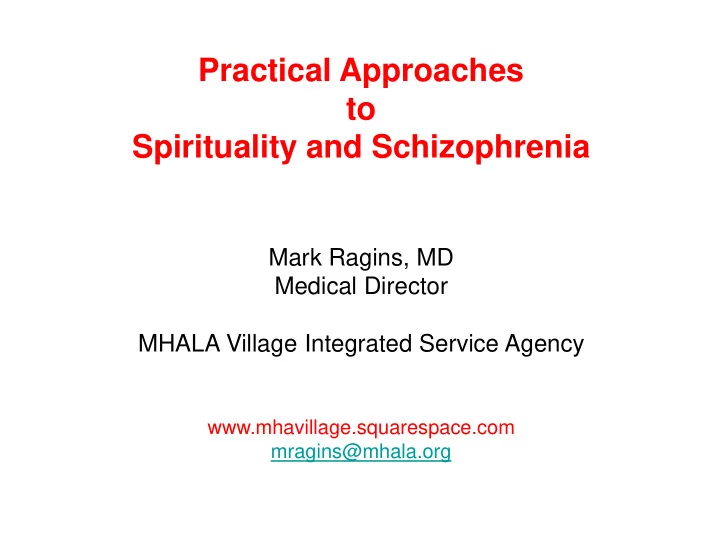

Practical Approaches to Spirituality and Schizophrenia Mark Ragins, MD Medical Director MHALA Village Integrated Service Agency www.mhavillage.squarespace.com mragins@mhala.org
Helping Relationships 1. Trust 2. Shared story 3. Shared plan Too often, when we’re working with someone who has a spiritual understanding of what’s happening to them, we don’t “meet them where they’re at” and successfully engage them
Shared Spiritual Stories • Disconnected from God • “Psychotics drown in the same deep waters that mystics swim gracefully in” • Tapped into spiritual levels of awareness or “spiritual circuitry” without the strength to handle it and became overwhelmed • Part of larger spiritual battle with important role • Demons feeding off of negativity • Childhood openness to spiritual abilities and experiences that weren’t mentored into adulthood • Attacked spiritually by someone with power • Personal crisis became spiritual crisis Worldwide people with spiritual explanations for their conditions do better than those with psychiatric explanations
Shared Spiritual Goals • Balance spiritual, emotional, and material levels of life – “a state of deep spiritual meditation may not be the safest way to cross a crowded street” • Strengthen foundation to support high levels of spiritual growth – e.g. better mental functioning, emotional balance, congregation, knowledge, modesty, moral behavior • Strengthen mind or personal boundaries to avoid being overwhelmed
Levels of Helping 1) Intellectual : Making diagnosis, giving medications, case management, skills training, cognitive therapies, psychoeducation, etc. This requires trust in professional expertise and giving people enough space to learn at their own pace instead of being force fed at our pace. 2) Emotional : compassion, empathy, believing in them, giving hope, caring, emotional healing, love, forgiveness, etc. This requires trust in personal caring and investment and welcoming their emotions knowing full well they may change us. 3) Spiritual : being “an angel,” God (or Christ)working through you, a “miracle” happened, “energetic healing,” praying for them, blessing, witnessing, communion, etc. This requires shared trust in power above us all, “faith”, and having enough acceptance to keep our will out of it so “God’s will be done”.
Spiritual Healing When we’re hurt our universal emotional response is to seek revenge, but that is virtually never healing (but it might make them stop). What works? • Acknowledgement of pain and suffering by perpetrator and sharing it • Cleansing / Acceptance • Turning it over to spiritual power for forgiveness • Personal forgiveness
Spirituality and Recovery • Hope – pray for help for yourself, God (or karma) will make it right, you’re not alone / God is with you • Empowerment – God give me the strength, God doesn’t make garbage / “in the image of God”, turning over life to “higher power” • Responsibility – moral duty, do the right thing • Meaningful roles – you’ve been put here for a reason, obligation to serve others and do God’s work, pray for others
Finding the Blessing • I wouldn’t wish it on anyone, but I’m grateful because… • I have a gift from my wound • I wouldn’t be who I am today without having gone through that suffering • There is a reason and a meaning for my suffering • It has opened my heart and brought me closer to God
THANK YOU! To get a copy of my book A Roa oad t o o Recov overy download at www.mhavillage.squarespace.com and click on “dr. mark’s writings” …where you will find more of Dr. Mark’s articles on recovery, or contact me at Mark Ragins, MD mragins@mhala.org 562-437-6717 x275 for more recovery oriented training, consultation and workforce development opportunities from Mental Health America of Los Angeles:
Recommend
More recommend